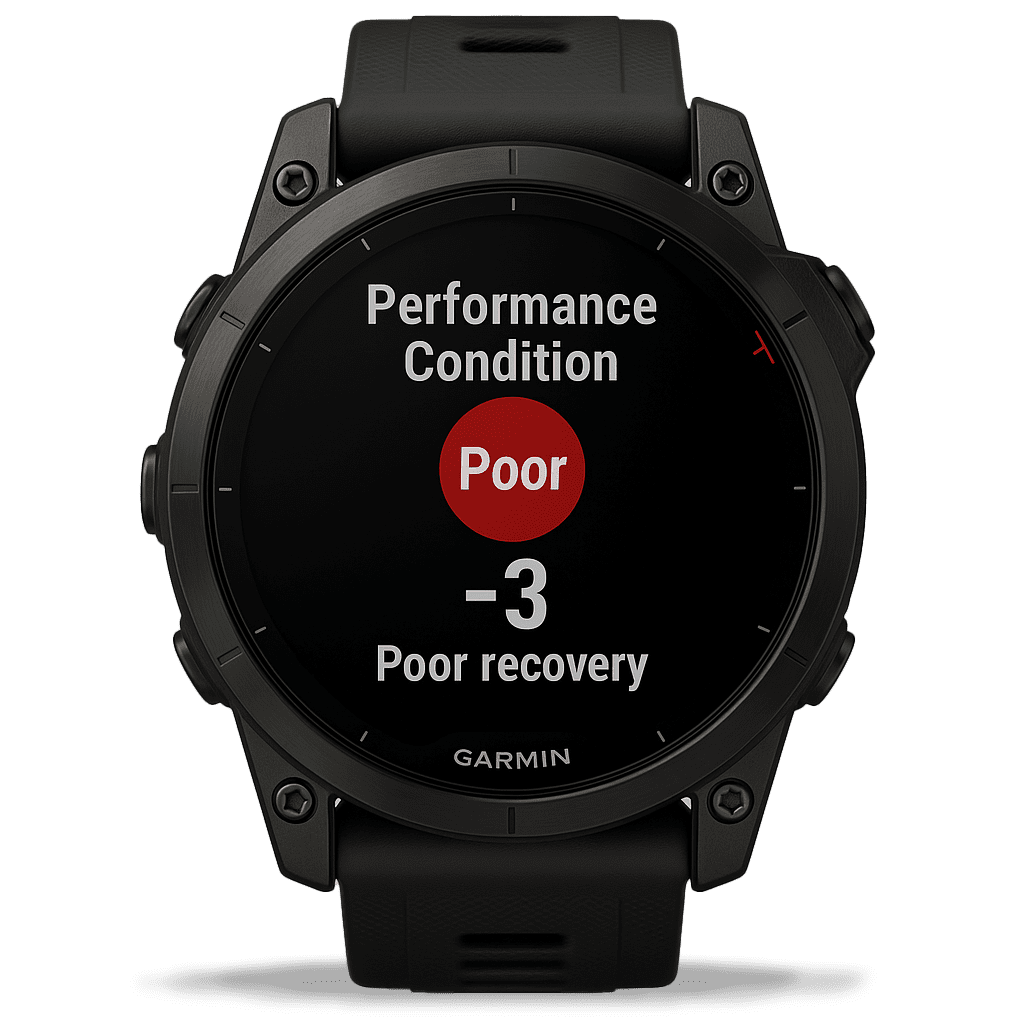Why Bad Runs Matter: Turn Off Days Into Long-Term Gains
Embracing the Grind: How to Learn From Your Worst Runs
Not every run will feel like a win—and that’s exactly why they matter. Bad runs aren’t failures, they’re part of the process. They teach you how to listen to your body, build mental toughness, and stay consistent even when your metrics (or Garmin) tell you otherwise. Don’t let a rough session define your progress—use it to sharpen your edge.
"Even a bad run moves you forward—if you’re willing to learn from it"-- Unknown
Today, I struggled with what should’ve been an ‘easy’ run. Six miles at an easy pace, but it felt like I was dragging bricks. My heart rate was high, my pace was slow, and to top it off, Garmin decided to downgrade my VO2 max.
If you’ve been there, you know the feeling: frustration, self-doubt, and those gnawing questions like, “Why the fuck did I even bother?” Sometimes, the numbers on your device don’t reflect the grind you’ve put in. And if you use Garmin, it feels even worse—because it’s like your watch is actively mocking you with its ‘feedback’.
Something was just off. Effort up, results down. But here’s the flip: days like this aren’t failures — they’re lessons in disguise.

Every Runner Has Bad Days (And That’s OK)
Let’s be real: if you’re the kind of person who willingly laces up overpriced trainers and hits the road (or trail), you’ve already joined the club. It doesn’t matter if you’re elite, a weekend warrior with delusions of Goggins, or just someone trying to outrun yesterday’s takeaway – bad runs come for all of us. And when they do, it’s humbling. It’s as if Nike herself (the Greek goddess, not the swoosh) is sitting on her celestial cloud, rolling her eyes and reminding us of our humanity.
The truth? There are countless reasons why your run might suck. Sleep, stress, hydration, nutrition – or the universe just flipping you the bird. Some days, everything clicks. Other days, it’s a slow-motion disaster, no matter how disciplined you are. But here’s the twist: when it’s bad, we obsess over what went wrong. Yet how often do we analyse when it goes right? We chalk up good days to luck or talent, and bad days to failure. That’s backwards. Both hold lessons.
Even the greats have their moments. Take Jonny Brownlee’s infamous collapse during the Triathlon World Series in Mexico. He was 700 metres from the finish when his body gave up – he was weaving like a drunk, and his brother Alistair had to drag him across the line. Olympic medallist or not, shit happens.
Bad runs remind us we’re human. And that’s not a bad thing.
What Bad Runs Teach Us (Beyond the Data)
Bad runs aren’t just there to ruin your Strava feed – they’re there to teach you something. The problem is, most of us are too busy sulking to notice the lesson. Let’s break it down:
Listen to Your Body (It’s Smarter Than You)
Was it fatigue? Poor recovery? Hydration? Your body doesn’t just stop performing for no reason. It’s sending signals – you’re just not paying attention. Maybe you’ve been skimping on sleep because you’re glued to TikTok at 11 pm. Or you’ve been smashing workouts without giving your legs enough time to recover. Perhaps you’ve been winging it with nutrition, thinking a cereal bar and a splash of water will do the job. Pay attention. When your body says, “I’m done,” respect it. Ignoring those signals is like driving on an empty tank and hoping for the best. Spoiler: it never ends well.
Mental Toughness Isn’t Built on Easy Days
You don’t get mentally stronger when everything’s perfect. You build grit when you’re in the trenches, questioning why you even started. Bad runs force you to dig deeper. They test your patience, your discipline, and your ability to push through when the rewards feel nonexistent. Remember this: your mind is the muscle you’re really training.
Fitness Progress Isn’t Linear
We love to think of progress as a steady, upward climb. Reality? It’s more like a drunken stumble – two steps forward, one step back. And that’s fine. Bad runs don’t erase your fitness gains. They’re just a blip, a reminder that your body is dynamic, not a machine. Some days, you’ll feel invincible. Other days, like today, it’ll feel like running through quicksand. Both are part of the process.
The Danger of Overreacting
However tempting and dark that conversation you’re having in your head gets, the fact is one or even two bad runs shouldn’t be a metric you use to define your fitness or progress. Let’s get real about a few things… Your fitness does not vanish overnight. I know it can feel like it, especially if you’ve partied a little too hard over xmas and you’re feeling it (and you can only blame yourself, right? Accountability can be a bitch) but a single bad run isn’t proof that you’ve lost all progress. Fitness doesn’t work like that. Fitness is built up over weeks, months and even years. Not one or even two ‘off’ days.
If you’re secretly looking for an excuse to go back to old habits, that’s on you. Just don’t let one bad run be the reason. Think about it: would you throw out your entire nutrition plan because of one dodgy meal? No. So why let one run mess with your head?
Metrics Aren’t Gospel
Let’s talk about Garmin (or whatever gadget you’ve got strapped to your wrist pretending to be your coach). Yes, it’s handy. Yes, it’s motivating. But it’s not gospel. Your watch doesn’t know you stayed up too late, that you’re stressed, or that the headwind was trying to knock you into next week.
I have an actual human coach and when tested I’ll take her expertise over any ‘device’ because she’s very good at her job. However, the fact she is good at her job means she will defer to me and ask me how I feel and what else may be going on at any point. And, on those occasions where I feel sorry for myself or moaned about VO2 from Garmin etc I’ve been called out with “Why do you give a shit what your watch says. Are your long runs easier at a quicker pace? Are you getting stronger?” etc.
So, when Garmin downgrades your VO2 max after a rough run, it’s not saying you’re suddenly unfit. It’s just an algorithm reacting to one bad data point. Algorithms don’t know that you barely slept last night or that your boss has been riding your arse all week. Or that there was a headwind, and most people stayed home because it is so shitty outside. Metrics are just numbers. You’re the context.
Consistency Beats Perfection
Progress isn’t about smashing every run. It’s about showing up – good days, bad days, and everything in between. I’ve learned this, often the hard way, in so many of my own life endeavours. So give yourself a break.
A bad run doesn’t derail your journey. What matters is the pattern you create over time. If you keep putting in the work, those ‘off’ days become a tiny blip in an otherwise strong trend. If you look at everything – running, bodybuilding, ballet, or being a badass entrepreneur – the secret sauce is always the same. It’s not talent or luck. It’s consistency. I’ll say it louder for the ones at the back: Consistency is the secret sauce. Always.
So, don’t overreact or beat yourself up. Bad runs mean you’re human. And the last time I checked, being human is kind of the point.
Reflect on What Went Wrong
After the run that inspired this post, I had to check myself. Garmin knocked my VO2 max down by a point, and honestly, it pissed me off. I already knew the run had been off, but seeing that number drop felt like a gut punch. It got under my skin for a solid few minutes – until I caught myself.
So yes, even people who seem like they’ve got it nailed falter. Why? Because we’re human. Let’s revisit that for a second. Life isn’t linear, and neither is progress.
If you’ve read any of my other stuff, you’ll know I’m a big believer in the concept of gain and loss. It’s baked into the very fabric of life, and the yin-yang symbol  captures this beautifully. People oversimplify it as just a symbol of balance, but it’s more than that. Look closely, and you’ll see a spiral – a dynamic cycle of gain and loss. To gain something, you often sacrifice or lose something else. It’s not static. Neither is your training, your fitness, or your life.
captures this beautifully. People oversimplify it as just a symbol of balance, but it’s more than that. Look closely, and you’ll see a spiral – a dynamic cycle of gain and loss. To gain something, you often sacrifice or lose something else. It’s not static. Neither is your training, your fitness, or your life.
So when you find yourself hosting a pity party after a bad run, take a breath and ask yourself a few simple but powerful questions:
- Did I get enough sleep?
- Was I dragging stress from work, life, or a relationship onto the road?
- Was I under-fuelled, dehydrated, or running on fumes because I skipped breakfast?
- Did I blow my pacing and burn out in the first mile?
- Are these new shoes just shittier than my old ones?
You don’t need to overthink it—just be honest with yourself. You don’t need a PhD in sports science to figure most of this out. It’s about listening to your body and connecting the dots.
Check Your Expectations
Sometimes, the real problem isn’t physical—it’s mental. Are you putting way too much pressure on yourself? Chasing numbers? Trying to prove something?
Here’s the thing: nobody else cares about your pace or splits. Seriously, no one. Not every run has to be a record-breaker. In fact, most of them shouldn’t be. Letting go of that all-or-nothing mindset is one of the best things you can do for both your progress and your sanity.
Bad Runs Are Data, Not Verdicts
A bad run isn’t a death sentence for your fitness. It’s just feedback—a single data point in a much bigger picture.
Think of it as an experiment. Ask yourself:
- “This didn’t work today. What can I adjust tomorrow?”
- “Do I need to tweak my pre-run routine?”
- “Should I switch up the time of day I run?”
- “Maybe my body’s screaming for a rest day, and I should actually listen.”
Fitness isn’t about being perfect. It’s about learning, adapting, and moving forward. The key is consistency. As long as the needle is moving in the right direction over time, you’re on track—even if it dips occasionally during a gear change.
So, the next time you have a shit run, remind yourself: it’s not the end of the world. It’s just part of the process. And the process is where the real magic happens.
Bad runs are inevitable, but they’re also valuable. They remind us that fitness, like life, isn’t linear—and that’s where the growth happens. These tough days teach us resilience, self-awareness, and patience.
Instead of spiralling into frustration or self-doubt, see bad runs for what they really are: stepping stones. Each one is a chance to learn, adapt, and grow stronger.
Action Steps
- Journal Your Run (or write a blog :P)
After every run, jot down a few quick notes. What went well? What didn’t? Over time, you’ll start to see patterns and gain insight into what makes a run feel great—or go sideways. - Take a Recovery Day if Needed
Listen to your body. I know this is tough for many of us but it could be telling you to rest, don’t ignore it. Recovery is as much a part of progress as the runs themselves. - Set a Small Goal for Your Next Run
Build confidence by focusing on something achievable—whether it’s running an easy pace, enjoying the scenery, or simply lacing up and showing up. - Reframe the Experience
Instead of dwelling on the frustration, ask yourself: “What is this teaching me about myself?” Use the answer as fuel for your next step forward.
Enjoyed this post or had a bad run lately? Let’s talk about it! Use the links below and don’t forget to share this post with someone who’d love it.

